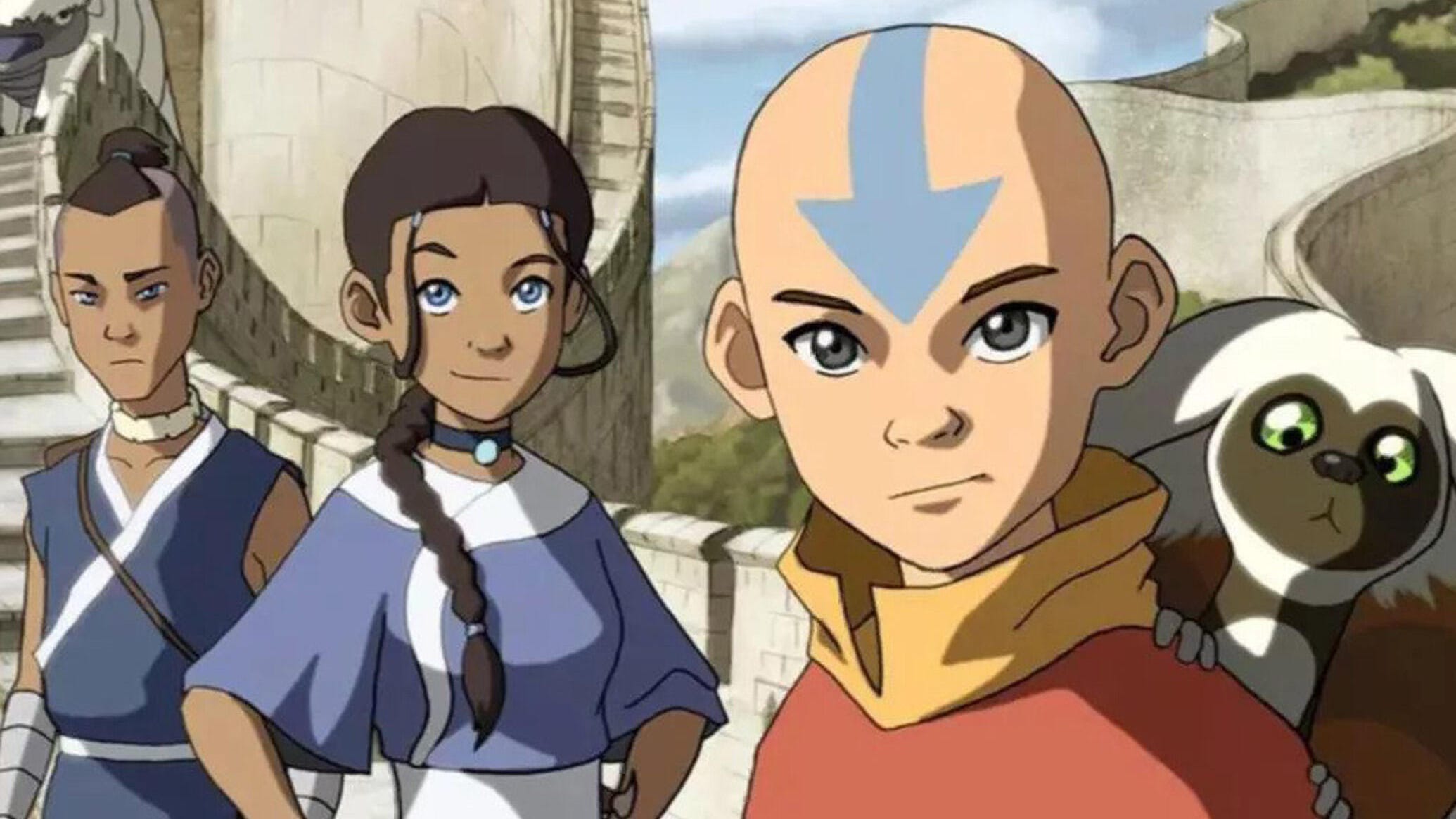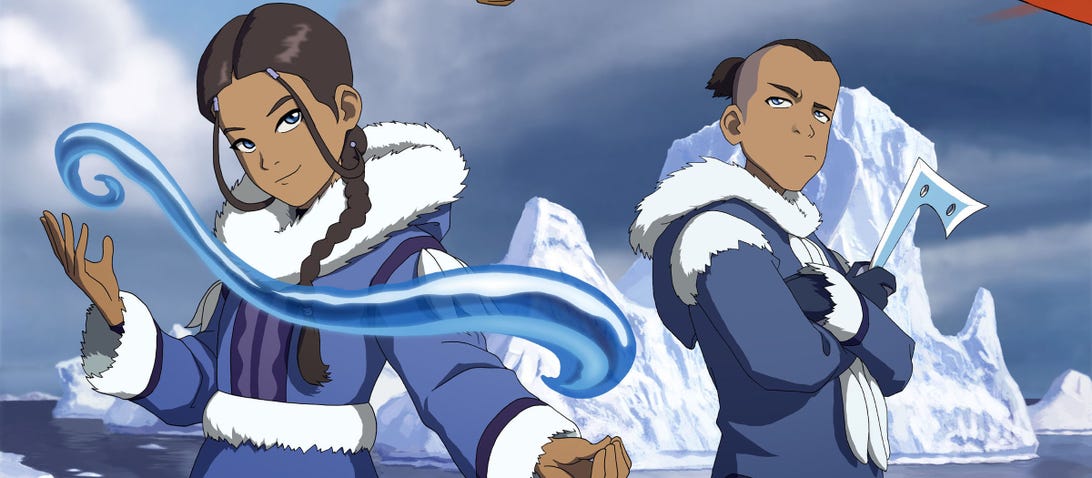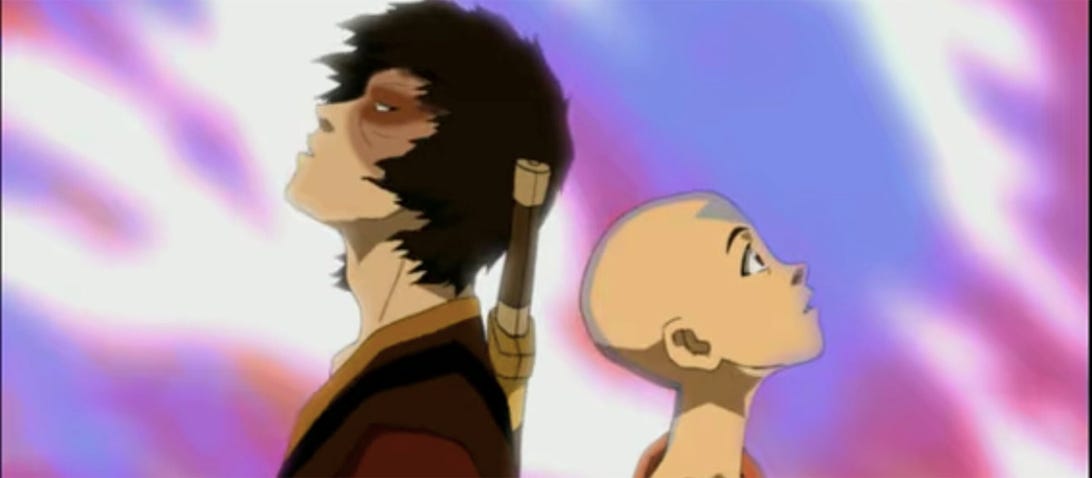
Why Avatar: The Last Airbender Is So Deserving of Its Netflix Renaissance
The Nickelodeon series is as relevant as ever

If you, like me, didn't leave your love of animated TV and movies behind when you turned 13, you probably stumbled across Avatar: the Last Airbender at some point. This three-season saga became a Nickelodeon classic and developed an intense following while it was on the air from 2005 to 2008, but its legacy is still alive and well all these years later. We live in a world that seems on the brink of destruction at any given moment, and escapism isn't the only thing Avatar can provide as you embark on your first (or your fifth) rewatch. It can also give you some insightful perspective on issues at play in the real world, both personal and political, and how to face them.
Avatar: The Last Airbender, tells the story of a young boy named Aang, who has the ability to bend — or manipulate — the four elements: Water, Earth, Fire, and Air. He is known as the Avatar, a reincarnated being who is the human embodiment of balance, spirituality, and peace on earth. The series followed Aang's journey to master all four elements and save the world from the Fire Nation and its firebending army, which had spent the last century conquering and subjugating the Water, Air, and Earth nations. With the help of his friends, some seriously bizarre animal companions, and an unlikely ally or two, Aang sets off on an adventure to restore peace and harmony to a war-ravaged world.
When Avatar: The Last Airbender dropped on Netflix on May 15, there was a resurgence of interest in the series, which rocketed to the top of Netflix USA's Top 10 list. It's the first animated TV series to ever take the No. 1 slot. There aren't many 15-year-old TV shows that make that list in the first place, let alone top it, so why are viewers, new and old, flocking to this series?

First and foremost, the one thing all Avatar fans can agree makes this show special is its compelling premise and dedicated world-building. The creators took the time to carefully craft four distinct nations (drawing inspiration from a variety of Asian cultures) and a complex web of sociopolitical issues that stem from their shared history. Since the main characters spend the entire series on the run, the audience gets to travel this fantastical version of Earth along with them and experience dozens of unique regions. In the first three episodes alone, the show paints a vivid picture of the various world powers at play, the main characters' motivations and missions, and the mythology of bending. Not bad for 65 minutes of television.
https://www.tvguide.com/news/tv-throwback-best-shows-to-rewatch/">TV Throwback: The Best Shows to Rewatch Right Now
I can't talk about what makes this show great without, of course, mentioning the action sequences, which areto die for. Because this is an animated series, the sky's the limit when it comes to what its battles can look like, and Avatar: The Last Airbender took that literally. There's a stunning amount of artistry behind each characters' bending that somehow makes the concept of shooting fire out of your fists or launching yourself 20 feet in the air seem like an entirely natural thing to happen instead of an out-of-this-world ability. Each of the four bending styles is based on a different form of Chinese martial arts, and you can see the stark differences between those styles in every bending battle. Waterbending, which draws inspiration from Tai Chi, is full of fluid, effortless movements, while earthbending, based on the Hung Gar style of kung fu, is rooted in raw power and force. After so many rewatches, I know some of these bending battles by heart, and yet I'm still mesmerized each time. Frame by frame, Avatar: The Last Airbender creates a feast for the eyes that just doesn't get old.
Though the series is primarily billed as an action/adventure, to stop there would be to miss some incredibly significant layers to this story. There is an undeniable sense of humor to the series, from slapstick pratfalls to dry wit, and while the more mature rewatcher likely will not laugh as hard at Sokka's antics this time around, Toph Beifong's sarcasm is not something you ever age out of. Avatar is perpetually concerned with balance, though, so the series' excellent comedy is complemented by some extremely emotional character arcs. Believe me, if I could make this entire essay about how there has never been and never will be a more perfect redemption arc than Prince Zuko's, I would.

Like many young adult adventure sagas, Avatar relies on a tight-knit group of youngsters to do the heavy-lifting plot-wise, but within the overarching story, each character has their own, distinct coming-of-age tale specifically tailored to them and their journey. Some are based in grief over a family member lost in the war. Some deal with finding strength and independence in a tumultuous world. And some are simply rooted in learning to love yourself, flaws and all. Aang's journey just so happens to be built on all three. These poignant character arcs only become more relatable each time you watch them, and I somehow seem to find new kernels of wisdom in episodes I've seen a dozen times when I approach them with a new mindset.
https://www.tvguide.com/news/best-2000s-shows-watch-right-now/">The Best 2000s Shows to Watch Right Now
Perhaps most importantly though, this half-hour cartoon managed to tackle incredibly mature subject matter like genocide, propaganda, patriarchy, redemption, and resistance in ways that made sense to its younger audience and instilled values that we still hold today. If you watched as a kid or young adult, Avatar: The Last Airbender probablytaught you what xenophobia and imperialism looked like before you understood what those concepts really meant. The fear and hatred the Earth Kingdom inhabitants had for the Fire Nation lived in every episode — and yes, the show made a point of distinguishing the turning point when fear turns to hatred and the dark path that leads you down. Though there wasn't a single moment you didn't realize that the Fire Nation's war was evil and unjust, the show also forced you to realize that you cannot declare an entire nation and its innocent civilians the enemy. The world is just more complicated than that.
And honestly, isn't that the real reason we're all clamoring to rewatch a cartoon from 15 years ago? Sure, we're attempting to reclaim that magic we felt watching it at a younger age and relive the storytelling through new eyes. Some of us are even introducing the series to our friends and families, hoping it will spark that same joy in someone else. But Avatar: The Last Airbender remains relevant today because the lessons it tries to teach are just as relevant to us as adults as they were when we were younger. Those messages matter to anyone who can look at today's political propaganda and recognize the same themes of corruption in Ba Sing Se's "cultural preservation" at work in their real lives, and to anyone who can watch Fire Nation children learn revisionist history about their war and recognize the chilling similarities in your own education system. And it absolutely matters to those of us who can see how divided and volatile our world has become and yet still remember that Aang's message was always one of peace, unity, and harmony. The words of wisdom he received on his journey all those years ago hit a deeper nerve now than perhaps they ever have: "The greatest illusion of this world is the illusion of separation. Things you think are separate and different are actually one and the same. We are all one people, but we live as if divided."
Ultimately, Avatar: The Last Airbender's true legacy was the undeniable sense of empathy it instilled in its viewers. Even if, like Zuko, we sometimes find it hard to listen to our better angels, we know the difference between right and wrong, and we know that mercy and compassion for others are paramount. If those are qualities you'd like to see more of in the world around you, I encourage you to take another look at this series and see if you can't relearn the lessons Avatar: the Last Airbender worked so hard to teach you.
Avatar: The Last Airbender is available to stream on Netflix. Check out more great 2000s shows to watch here.
Looking for more shows to stream? Check out TV Guide's TV Throwback, recommending the best shows to rewatch — or to discover for the first time — from 1970 through the present day.

